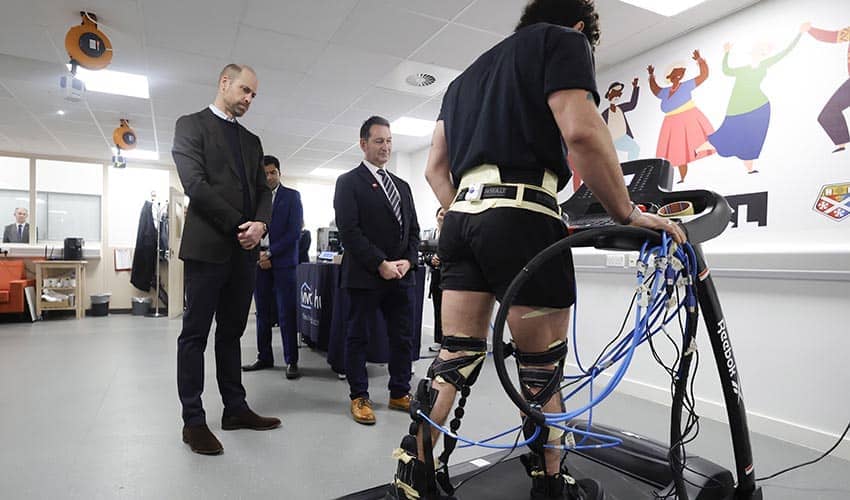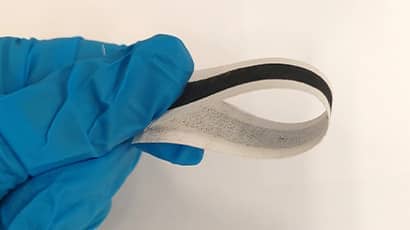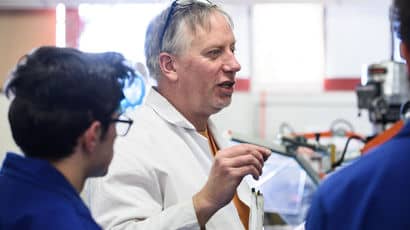Health-tech start up MyCelsius launches breakthrough cooling tech for hot flushes developed at UWE Bristol’s Launch Space

A pioneering Bristol-based health-tech company developing cutting-edge cooling technology for hot flushes has credited UWE Bristol’s Launch Space incubator with playing a key role in accelerating its product development and engineering breakthroughs.
Hot flushes affect millions across the UK, yet practical, science-backed solutions remain limited. The startup’s newly launched wrist-worn product uses a miniaturised cooling system capable of lowering skin temperature by up to 19.5°C in three minutes, with 10°C delivered in the first 10 seconds alone.
MyCelsius, co-founded by Maxime Kryvian, who personally experienced hot flushes due to stress and anxiety and Aonghus O’Donovan, an ex-Dyson engineer, has spent the last three years developing the device to deliver rapid, targeted cooling to manage hot flushes – particularly during menopause and periods of stress.
The wearable provides an instant cold sensation on your wrist to cool and calm the body in moments of overheating, giving relief within seconds and the ability to nip a hot flush in the bud, improving sleep and daily comfort. It’s one of the most powerful miniaturised cooling systems of its kind and is an intervention-first wearable, unlike most devices, which focus on data tracking.
MyCelsius is currently based at UWE Bristol’s Launch Space incubation hub, part of the University Enterprise Zone for aspiring entrepreneurs and early-stage tech startups, and its team’s engineering background spans aerospace, aeronautics, Formula One and Dyson.

Maxime Kryvian, MyCelsius co-founder and CEO, said: “Women’s health has historically received far less attention and innovation than it needs, with hot flushes a daily reality for millions who feel there are few practical solutions available. We aim to bridge that gap, driving innovation to support wellbeing and confidence for women and for people who struggle with hot flushes on a daily basis.
“The environment at UWE Bristol has been instrumental in helping a small team rapidly develop and refine advanced hardware that demands extremely high engineering precision.
Being embedded in Launch Space has given us access to world-class engineering support just when we needed it most.”
The combination of engineering expertise, facilities and instant user access has created a development environment rarely available to early-stage hardware startups.
User trials with UWE Bristol’s menopause support group, Menochat, provided continuous feedback on the cooling bracelets’ effectiveness, size, design, usability and style – shaping multiple engineering decisions and accelerating development timelines. This feedback loop allowed MyCelsius to quickly refine prototypes despite limited funding and a small team, creating a user-led, science-backed approach to women’s health innovation.
Unlike most wearables, which focus on tracking metrics, MyCelsius was built around intervention. Using an advanced and patent-pending thermo-electric technology system, it targets thermal nerve receptors in the wrist – one of the most temperature sensitive areas of the body – to interrupt the incorrect ‘overheating’ signal sent by the brain during a hot flush.
Trials have shown that the MyCelsius Cooling Bracelet can help reduce perspiration, heart racing and vasodilation more quickly and effectively, which halts a hot flush in its tracks. MyCelsius launched publicly just three weeks ago and is already receiving strong customer feedback and growing interest from health partners, employers and innovation networks.
Mahmoda Ali from Enterprise at UWE Bristol, which includes Launch Space, said: “MyCelsius is the perfect example of the high-impact, tech-enabled innovation that Launch Space exists to support.
“Developing advanced hardware of this complexity is a huge challenge for an early-stage business, and the team has made exceptional use of the facilities, expertise and specialist capabilities available within the Bristol Robotics Laboratory.
“What stands out in particular, is the speed at which MyCelsius has been able to iterate the product, working closely with our academic community and user groups on campus. It’s rare for a university to play a direct role in shaping the design of a product, and this is exactly what Launch Space is designed to enable.”
Related news

22 January 2026
Prince of Wales visits UWE Bristol to see pioneering robotic tech tackling societal health challenges
The Prince of Wales visited the Bristol Robotics Laboratory (BRL) at the University of the West of England’s (UWE Bristol) Frenchay campus today (22 January 2026) to learn about the pioneering robotic technologies being developed to help the ageing and disabled population maintain mental and physical wellbeing and remain independent for longer.

03 January 2025
Big leap forward for environmentally friendly ‘e-textiles’ technology
Research led by UWE Bristol and the University of Southampton has shown wearable electronic textiles (e-textiles) can be both sustainable and biodegradable.

22 October 2024
‘Life changing’ prosthetic leg developed at UWE Bristol to be trialled at global competition
Researchers from UWE Bristol are preparing to showcase an advanced bio-inspired prosthetic leg they have developed to improve the quality of life for people with above-knee amputations.

13 February 2024
Funding secured to develop sustainable health-monitoring e-textiles
A UWE Bristol academic has been given a New Investigator Award to further develop wearable sustainable e-textiles to monitor heart patients.

04 December 2023
Prestigious fellowship awarded to UWE Bristol academic to fund development of music technology
A UWE Bristol professor has been awarded a fellowship which will fund the development of a radically new approach to digital musical instrument design.

21 February 2023
UWE Bristol pioneers the development of wearable health-monitoring e-textiles
The reality of everyday use of sustainable wearable electronic textiles for personalised health monitoring has moved one step closer.
You may also be interested in

Media enquiries
Enquiries related to news releases and press and contacts for the media team.

Find an expert
Media contacts are invited to check out the vast range of subjects where UWE Bristol can offer up expert commentary.






